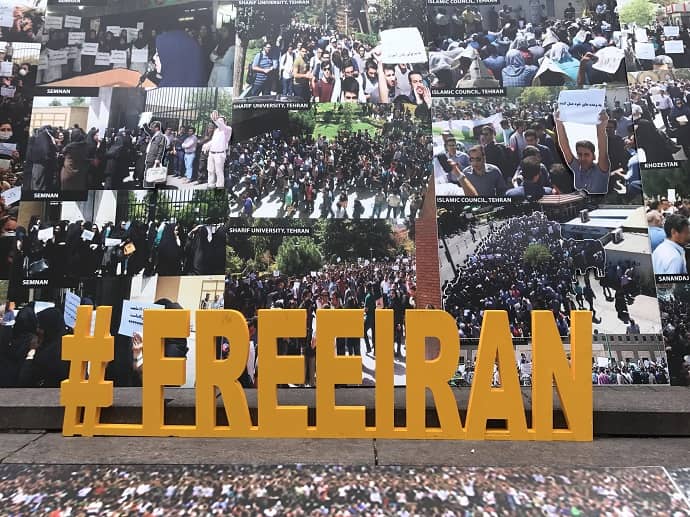This is a line from Baktash Abtin, a poet who was imprisoned for writing about life, freedom, and protest against “cheap and affordable death” in Iran. Abtin never surrendered to the mullahs, but sadly he remained in chains until his death, after being transferred to the hospital at the height of his serious illness.
Baktash Abtin, a political prisoner who died in captivity on January 8, is the latest victim of a series of murders by the mullahs, known as ‘Chain Murders’. The crimes began in the 1990s and continue to this day, and they have sparked waves of social unrest and international condemnation of the clerical regime. On the day of Abtin’s funeral in Imamzadeh Abdullah Shahr Rey, people shouted “Death to the oppressors” and “Peace be upon Abtin”.

At the same time, in Evin prison, Abtin’s fellow inmates and associates ignored the threat of Khamenei’s guards and chanted “Death to Khamenei” and “Death to the dictator.”
People also lit candles in front of Sasan Hospital in memory of Abtin, while Khamenei’s repressive agents surrounded the hospital in fear of the movement spreading.
Khamenei and his criminal regime are using these chain murders in an effort to silence the voices and the pens of those who do not succumb to censorship but rather speak of freedom and write about people’s rights. But just as the murder of Sattar Beheshti has plagued Khamenei and his murderous mafia for nine years now, with the Iranian people calling for justice in his name, Abtin’s death spared a similar movement in a matter of only days.

This has raised concerns about the social consequences of the crime, with state-run newspaper Mostaghel warning on January 10 of an even greater increase in public expressions of hatred for the regime. It wrote: “God forbid that these behaviors and narrow-mindedness have no further effect, other than to widen the gap between the government and the people.”
The regime’s actions raise the question: How does a writer like Beheshti or Abtin, whose only weapon is his pen, pose such a threat as to justify the mullahs ordering his death? As much as the regime attempts to claim it is a mighty superpower, its system cannot be anything but fragile, if it is threatened by words.
Paradoxically, the regime needs to compensate for this fragility by silencing its critics but faces a new wave of unrest and new demands for justice every time it silences one or more critics with murder. This was the case with Abtin’s murder, and it was also the case with the massacre of political prisoners in 1988, the suppression of anti-government uprisings in November 2019, the downing of Ukraine International Airlines Flight 752, and various other crimes spanning the regime’s history.
The most important lesson from the regime’s latest blatant crime is that this medieval dictatorship does not tolerate any genuine opposition, even in the form of poetry and writing.
There are ever-growing indications that the Iranian people, particularly the youth, have fully realized how the future of Iran should be shaped vis-à-vis the clerical regime. Young people shouted at Abtin’s funeral: “Death to the dictator” and “We have come to fight, fight and we will fight back”.





